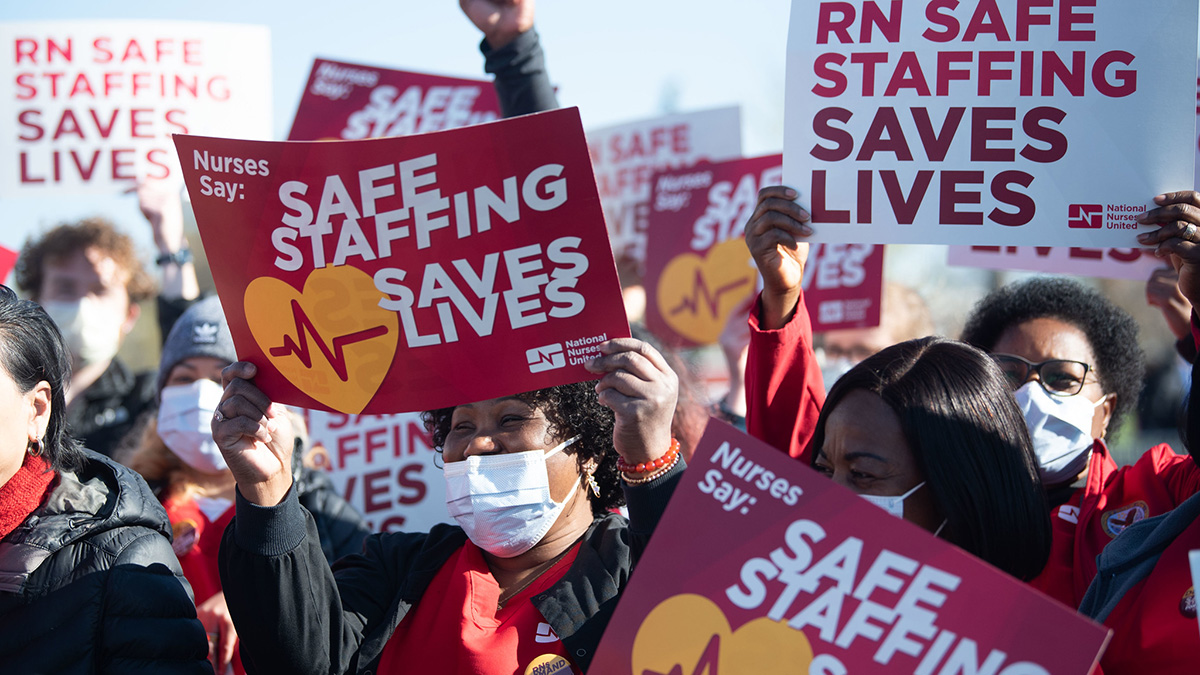Blog
As the Covid public health emergency declaration comes to an end, here’s what nurses want you to know

On May 11, during Nurses Week, the Covid public health emergency declaration expired. With this emergency era concluding — at least on paper, although it’s clear Covid is still a major threat — have hospital executives learned lessons that will help them better protect patients in a future emergency? Ask any nurse, and you will get a resounding, “No.”
Hospital executives are not only unprepared for the next pandemic, they are also operating health care facilities in a state of ongoing crisis every single day. That’s why nurses across the United States cannot let this moment pass without getting loud about nurse-led solutions that will keep patients safe moving forward. Here’s what our employers and elected officials must know, based on lessons we nurses have learned from our years on the front lines of the pandemic:
We need safe nurse-to-patient staffing ratios now. Hospital executives have always padded their wallets by slashing their staffing budgets. They pile endless patients on one nurse, and we race through 12-plus-hour shifts trying to decide who to care for first: the patient in excruciating pain, the patient struggling to breathe, the patient lying in their own feces. We don’t have a moment to eat or use the restroom, and we often end our shifts crying in our cars. During Covid, the existing staffing crisis blew up to nightmarish proportions, but just because the pandemic emergency is ending on paper, it doesn’t mean there is now a “safe” national staffing level to which we can return.
Congress must listen to nurses and pass The Nurse Staffing Standards for Hospital Patient Safety and Quality Care Act without delay. This bill, introduced in March by Sen. Sherrod Brown and Rep. Jan Schakowsky, would set federal limits on how many patients nurses can safely care for at once, and we need that national mandate because our profit-driven employers won’t invest in safe staffing on their own. National Nurses United, the largest union of registered nurses in the United States, has been fighting to pass this legislation for decades because we know safe staffing limits improve patient outcomes, decrease workplace violence, and attract and retain nurses. (California implemented nurse-to-patient safe staffing limits in 2004, thanks to the unrelenting advocacy of NNU affiliate the California Nurses Association, and these limits have proven to work).
Our employers were allowed to cut more corners than ever before during Covid, causing their profits to balloon, so now, they want to cut those same corners — forever. In a recent letter to the U.S. Department of Health and Human Services, corporate industry group the American Hospital Association argued that the Covid emergency may be ending, but they should still be allowed “expanded use of telehealth” (jargon for pushing more care into patients’ homes so employers can further slash staffing budgets), “workforce flexibilities” (translation: piling even more patients onto even fewer nurses), and “the reduction of unnecessary regulatory and data reporting requirements” (they don’t want to be held accountable in any way).
Our corporate employers will even claim there is a “nursing shortage” caused by Covid. There’s no “shortage” of registered nurses in the United States. One million licensed RNs are not currently working as RNs according to the National Council of State Boards of Nursing and the U.S. Bureau of Labor Statistics. They simply leave their jobs and the profession because they’re unwilling to risk their licenses, their patients’ lives, and their own safety working in dangerous conditions. We’ll never be prepared for the next emergency until this employer-created staffing crisis is resolved. We must listen to nurses and pass safe staffing ratios without delay.
To be ready for future emergencies, nurses also need strong legislation to protect us from health care workplace violence. In Covid-era surveys of nurses across the country, NNU chronicled an increase in health care workplace violence. There are clear prevention measures our employers should be taking to keep us, our patients, and visitors safe from violence, and a bill backed by NNU would mandate that they act to protect us.
Nurses also deserve the right to organize a union so they can collectively fight for safe patient care conditions. Since the pandemic began, unionized nurses have been able to win access to PPE and other worker and patient protections through their union, while nurses in non-union hospitals have found it more challenging to secure the protections they need. And yet, current labor law does far too little to protect workers’ right to join a union. The PRO Act is an important step to protect workers’ rights to organize a union without fear of retaliation.
Nurses and other health care workers also need a permanent Occupational Safety and Health Administration (OSHA) standard to protect us from infectious diseases. If Covid taught us anything, it’s that when we’re not safe, we can’t keep our patients safe. Nurses have fought for years to win federal protections from infectious diseases, and they still haven’t been enacted. We will never be ready for the next emergency until they are.
Every Nurses Week, our employers pay lip service to caring about us by throwing us pizza parties. This year’s Nurses Week was no different. We’ve had enough of platitudes when they’re not doing enough to protect us or our patients. The pandemic emergency era may have concluded on paper, but our sacred oath to protect our patients has no end in sight. Nurses will keep fighting forward to advance our solutions to put patients first.
Bonnie Castillo, RN, is Executive Director of National Nurses United